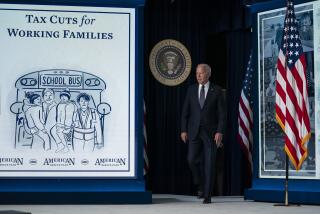Hike the Cigarette Tax and Insure Children
- Share via
The House-Senate conference committees on the balanced budget bills have a historic opportunity to approve a substantial increase in the cigarette tax and to take a giant step toward the goal of providing health insurance for all children.
The need for action is clear. More than 10 million children--one in every seven--have no health insurance. Every day, another 3,000 children lose private health insurance. If this trend continues, more than 12 million children will have no medical coverage by 2000.
Too many young children do not receive the preventive medical care they need. Uninsured children are 50% more likely to die in the hospital than insured children. For millions of these children, the only family doctor they know is in a hospital emergency room, and for too many, that’s too late.
Uninsured children frequently go without medical care for routine conditions like asthma, strep throat and ear infections, which can develop into life-threatening illnesses or life-long disabilities if left untreated. Often, such children also don’t have access to eyeglasses, hearing aids and dental care.
The lack of health care for children affects the education system, too. Children who are sick can’t study well in school and frequently are absent. Children who have difficulty seeing the blackboard or who can’t hear the teacher can’t succeed in the classroom.
Ninety percent of uninsured children live in working families. Most of these families have incomes too high to qualify for Medicaid but too low to afford private health insurance. No family should have to choose between paying the rent, putting food on the table or obtaining health care.
Several months ago, we--along with Sen. Orrin Hatch, Rep. Bob Matsui and others--introduced bipartisan legislation in the House and Senate to address these issues. Our bill would have raised the federal cigarette tax to 67 cents a pack from 24 cents. This increase would have brought in $30 billion in additional revenue over the next five years, $20 billion to help families purchase private health insurance for uninsured children and $10 billion for deficit reduction. Combined with the $16 billion over the next five years for child health insurance included in the budget agreement between the Clinton administration and the Republican leadership in Congress, enough funds would have been available to guarantee affordable health insurance for every uninsured child.
For years, tobacco companies have cynically targeted children. Smoking costs the nation $50 billion a year in direct health costs and another $50 billion in lost productivity. The average pack of cigarettes sells for $1.80 today, yet it costs the nation $3.90 in smoking-related expenses.
If we do nothing, 5 million of today’s children will die from smoking-related illnesses. Ninety percent of smokers become addicted before they turn 18, and more than half become addicted before their 16th birthday. Increasing the cigarette tax is one of the single most effective steps we can take to reduce tobacco addiction. It has been shown that consumption drops significantly when the price per pack increases. Our 43-cent-a-pack increase would have saved a million of today’s children from premature death as the result of smoking-caused illnesses.
The tobacco tax increase in the Senate-passed version of the tax bill is 20 cents. Half of the revenue raised--$8 billion--is earmarked for children’s health insurance. When combined with the $16 billion included under the budget agreement, the Senate bill would still dedicate $24 billion for children’s health insurance over the next five years. This sum is enough, according to the Children’s Defense Fund, to cover as many as 6 million uninsured children by 2002, when the program is fully phased in. About half of the children who would otherwise be uninsured in 2002 will be covered.
The Senate-passed provision would be a major down payment on the goal of affordable health insurance for every family. The 20-cent-per-pack tax increase would save the lives of 400,000 children by deterring them from smoking. But despite an overwhelming 80-19 Senate vote in support of this program, the tobacco lobby is working overtime to scuttle the increased tobacco tax and the additional funds for children’s health insurance that come with it. Without the cigarette tax increase, there would only be enough funds to cover 4 million children.
Instead of cutting back on the Senate bill’s expanded funding for children’s health insurance and the cigarette tax increase, the bill should be improved in at least three respects:
* Congress should make sure that these funds are actually used to cover uninsured children, not for other health-related programs or to replace existing private coverage or state spending.
* The benefit package should be broad enough to meet the needs of low-income uninsured children, including those who are disabled or who have special development problems.
* The final bill should also allow states to help families pay premiums for employer-sponsored coverage, a concept included in the House bill. This would give states greater flexibility and families more consistency.
Instead of placating big tobacco, Congress should embrace this unusual opportunity to deal effectively with the shamefully long-standing crisis of uninsured American children.
More to Read
Get the L.A. Times Politics newsletter
Deeply reported insights into legislation, politics and policy from Sacramento, Washington and beyond. In your inbox twice per week.
You may occasionally receive promotional content from the Los Angeles Times.










